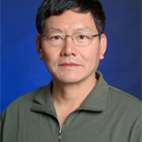Areas of Focus
- Molecular Oncology and Protein Engineering
Work Experience
- 2004-08 to Present - Institute of Biophysics, Chinese Academy of Sciences - Researcher
- 2000-01 to 2004-07 - Columbia University - Assistant Professor
Academic Background & Achievements
- 1988-09 to 1994-01 Ph.D. in Radiobiology: Colorado State University
- 1983-09 to 1986-07 M.Sc. in Science: Institute of Zoology, Chinese Academy of Sciences
Publications
- Two Distinct States of Escherichia coli Cells That Overexpress Recombinant Heterogeneous β-Galactosidase, Hang Haiying, 2012
- Affinity maturation of anti-TNF-alpha scFv with somatic hypermutation in non-B cells, Hang Haiying, 2012
- A role for the arginine methylation of Rad9 in checkpoint control and cellular sensitivity to DNA damage, Hang Haiying, 2011
- Effects of Simulated Microgravity on Embryonic Stem Cells, Hang Haiying, 2011
- Targeted deletion of mouse Rad1 leads to deficient cellular DNA damage responses, Hang Haiying, 2011
- Mouse Rad1 deletion enhances susceptibility for skin tumor development, Hang Haiying, 2010
- Enrichment of Escherichia coli Spheroplasts Displaying scFv Antibodies specific for antigens expressed on the human cell surface, Hang Haiying, 2010
- Rad9 is required for B cell proliferation and immunoglobulin class switch recombination, Hang Haiying, 2010
- Structure and functional implications of the human rad9-hus1-rad1 cell cycle checkpoint complex, Hang Haiying, 2009
- Phosphorylation Sites on Tyr28 and the C-terminus of Rad9 are Required for Inhibition of Premature Chromosomal Condensation Across the Entire S Phase, Hang Haiying, 2008
- Rad9 plays an important role in DNA mismatch repair through physical interaction with MLH1, Hang Haiying, 2008
- Targeted deletion of Rad9 in mouse skin keratinocytes enhances genotoxin-induced tumor development, Hang Haiying, 2008
- Improving Penetration in Tumors with Nano-assemblies of Phospholipids and Doxorubicin, Hang Haiying, 2007





